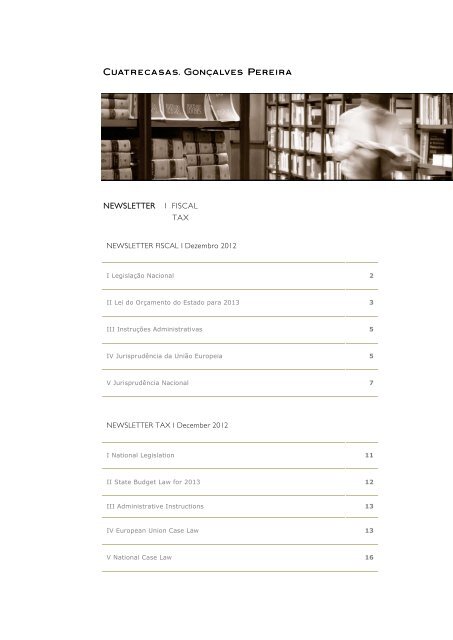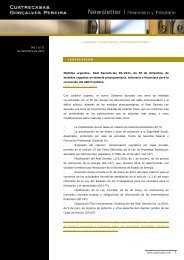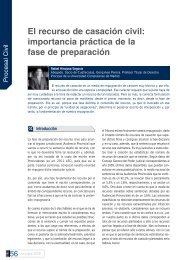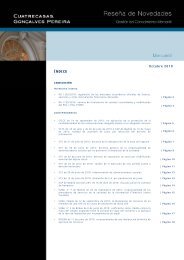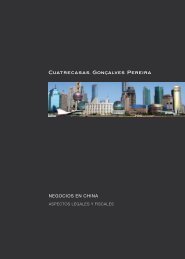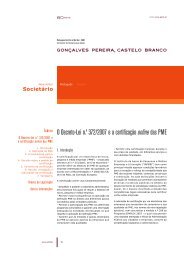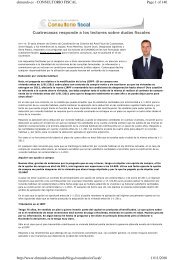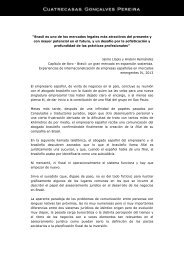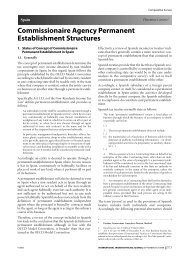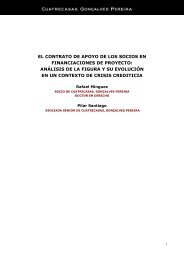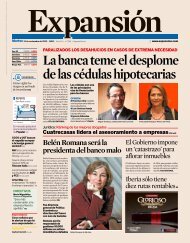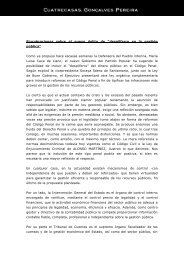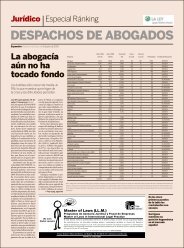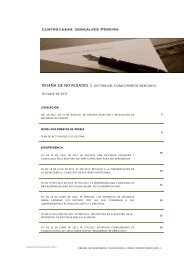NEWSLETTER I FISCAL TAX - Cuatrecasas
NEWSLETTER I FISCAL TAX - Cuatrecasas
NEWSLETTER I FISCAL TAX - Cuatrecasas
You also want an ePaper? Increase the reach of your titles
YUMPU automatically turns print PDFs into web optimized ePapers that Google loves.
<strong>NEWSLETTER</strong><br />
I <strong>FISCAL</strong><br />
<strong>TAX</strong><br />
<strong>NEWSLETTER</strong> <strong>FISCAL</strong> I Dezembro 2012<br />
I Legislação Nacional 2<br />
II Lei do Orçamento do Estado para 2013 3<br />
III Instruções Administrativas 5<br />
IV Jurisprudência da União Europeia 5<br />
V Jurisprudência Nacional 7<br />
<strong>NEWSLETTER</strong> <strong>TAX</strong> I December 2012<br />
I National Legislation 11<br />
II State Budget Law for 2013 12<br />
III Administrative Instructions 13<br />
IV European Union Case Law 13<br />
V National Case Law 16
<strong>NEWSLETTER</strong> <strong>FISCAL</strong><br />
I LEGISLAÇÃO NACIONAL<br />
Portaria n.º 401/2012, de 06/12<br />
Procede à actualização dos coeficientes de desvalorização da moeda a aplicar aos bens e<br />
direitos alienados durante o ano de 2012.<br />
Lei n.º 63/2012, de 10/12<br />
Aprova benefícios fiscais à utilização das terras agrícolas, florestais e silvopastoris e à<br />
dinamização da «Bolsa de terras».<br />
Portaria n.º 413/2012, de 17/12<br />
Aprova as instruções de preenchimento da declaração modelo 37 - «Juros e Amortizações<br />
de Habitação Permanente, Prémios de Seguros de Saúde, Vida e Acidentes pessoais,<br />
PPR, Fundos de Pensões e Regimes Complementares».<br />
Portaria n.º 414/2012, de 17/12<br />
Aprova a declaração modelo 39 - «Rendimentos e Retenção a Taxas Liberatórias» e as<br />
respectivas instruções de preenchimento.<br />
Portaria n.º 415/2012, de 17/12<br />
Aprova as instruções de preenchimento da declaração modelo 13 - «Valores mobiliários,<br />
warrants autónomos e instrumentos financeiros derivados».<br />
Portaria n.º 464/2012, de 17/12<br />
Aprova a declaração modelo 42 - «Subsídios ou Subvenções Não Reembolsáveis» e as<br />
respectivas instruções de preenchimento.<br />
Lei n.º 64/2012, de 20/12<br />
Procede à segunda alteração à Lei n.º 64-B/2011, de 30 de Dezembro (Orçamento do<br />
Estado para 2012), no âmbito da iniciativa para o reforço da estabilidade financeira.<br />
Decreto-Lei n.º 263/2012, de 20/12<br />
Transpõe a Directiva n.º 2010/24/UE, do Conselho, de 16 de Março de 2010, relativa à<br />
assistência mútua em matéria de cobrança de créditos respeitantes a impostos, direitos e<br />
outras medidas, definindo os termos de aplicação do regime de assistência mútua à<br />
cobrança a que fica sujeito o Estado Português.<br />
Portaria n.º 421/2012, de 21/12<br />
Aprova os novos modelos de impressos a que se refere o n.º 1 do artigo 57.º do Código do<br />
IRS.<br />
Portaria n.º 426-A/2012, de 28/12<br />
WWW.CUATRECASAS.COM <strong>NEWSLETTER</strong> I <strong>FISCAL</strong> I <strong>TAX</strong> 2/18
Aprova o modelo oficial de declaração para a comunicação dos elementos das facturas, por<br />
transmissão electrónica de dados, prevista na alínea d) do n.º 1 do artigo 3.º do Decreto-lei<br />
n.º 198/2012, de 24 de Agosto.<br />
Portaria n.º 426-B/2012, de 28/12<br />
Aprova os modelos das faturas-recibo para efeitos do disposto no artigo 115.º ao Código do<br />
IRS.<br />
II LEI DO ORÇAMENTO DO ESTADO PARA 2013 – PRINCIPAIS ALTERAÇÕES FISCAIS<br />
Foi publicada no Diário da República a Lei n.º 66-B/2012, de 31 de Dezembro que aprova<br />
o Orçamento do Estado para 2013.<br />
Identificamos, ainda assim, as principais alterações aos impostos directos (IRS e IRC) a<br />
introduzir pelo Orçamento do Estado para 2013.<br />
Imposto sobre o Rendimento das Pessoas Singulares (IRS)<br />
Relativamente aos rendimentos da categoria A, prevê-se a eliminação da dedução<br />
específica de despesas de formação profissional e alteração das regras de atribuição de<br />
ajudas de custo, v.g. aumento da distância das deslocações diárias e por dias sucessivos,<br />
de 5 km para 20 km e de 20 km para 50 km, respectivamente.<br />
Estipula-se a tributação em IRS das remunerações dos deputados do Parlamento<br />
Europeu.<br />
Relativamente aos rendimentos da categoria B, alteração para 75% do coeficiente para<br />
efeitos de determinação do rendimento tributável para as prestações de serviço no<br />
âmbito do regime simplificado de tributação.<br />
Prevê-se, ainda, a possibilidade de optar pelo regime de contabilidade organizada até 30<br />
de Janeiro de 2013.<br />
Relativamente aos rendimentos da categoria F, possibilidade de dedução do montante de<br />
Imposto Selo que incida sobre o valor dos prédios, desde que tenha sido feito o<br />
respectivo englobamento.<br />
Prevê-se a redução de 8 para 5 do número de escalões de IRS e alteração das taxas<br />
gerais.<br />
É introduzida uma sobretaxa de 3,5%, em moldes similares à sobretaxa aplicada no ano<br />
de 2011.<br />
WWW.CUATRECASAS.COM <strong>NEWSLETTER</strong> I <strong>FISCAL</strong> I <strong>TAX</strong> 3/18
Os limites legais das deduções de despesas de saúde, educação, formação, pensões de<br />
alimentos, encargos com lares e imóveis e benefícios fiscais são reduzidos. Apenas as<br />
deduções relativas a dependentes são aumentadas.<br />
A taxa máxima de retenção na fonte para os rendimento das categorias A e H passa para<br />
45% e 25% para os rendimento das categorias B e F.<br />
Imposto sobre o Rendimento das Pessoas Colectivas (IRC)<br />
Substitui-se o regime de subcapitalização pela limitação à dedutibilidade de gastos<br />
financeiros até à concorrência do maior dos seguintes limites: EUR 3 milhões ou 30% do<br />
resultado antes de depreciações, gastos de financiamento líquido e impostos. Prevê-se,<br />
contudo, a aplicação de um regime transitório para plena aplicação do limite EBITDA,<br />
aplicando-se em 2013 o limite de 70%, sendo o mesmo reduzido ao ritmo de 10% ao ano<br />
até 2017.<br />
Os rendimentos de entidades não residentes sem estabelecimento estável em Portugal<br />
provenientes de royalties, know-how, assistência técnica, resultantes do uso ou<br />
concessão de uso de equipamento comercial, industrial, agrícola ou científico, comissões<br />
por intermediação, prestações de serviços e rendimentos prediais passam a ser<br />
tributados à taxa de 25%.<br />
A taxa de 5% da Derrama Estadual passa a ser aplicável a lucros tributáveis superiores a<br />
EUR 7.500.00,00 sendo feito o correspondente ajustamento ao nível do PEC.<br />
As despesas com a modificação ou aquisição de programas e equipamentos informáticos<br />
de facturação em consequência das obrigações de comunicação estatuídas no Decreto-lei<br />
n.º 198/2012, de 24 de Agosto podem ser consideradas gasto fiscal no período de<br />
tributação em que tenham lugar.<br />
O Governo fica autorizado a alterar o regime de pagamento de IRC nos casos de<br />
transferência de sede e direcção efectiva de Portugal para outra jurisdição bem como nos<br />
casos de cessação de actividade em Portugal de entidade não residente, na sequência da<br />
condenação explanada no Acórdão do Tribunal de Justiça da União Europeia de 6 de<br />
Setembro de 2012, processo n.º C-38/10.<br />
III INSTRUÇÕES ADMINISTRATIVAS<br />
Autoridade Tributária e Aduaneira<br />
Informação Vinculativa de 3/12/2012<br />
Aplicação do regime especial de neutralidade fiscal às operações de fusão<br />
inversa<br />
Artigo 73.º do CIRC<br />
WWW.CUATRECASAS.COM <strong>NEWSLETTER</strong> I <strong>FISCAL</strong> I <strong>TAX</strong> 4/18
A presente informação vinculativa vem recusar a aplicação do regime de neutralidade<br />
fiscal, previsto no artigo 73.º do CIRC, às operações de fusão inversa quando os únicos<br />
activos transferidos são as próprias participações sociais detidas pela sociedade<br />
incorporante dada a inexistência de razões económicas válidas. Para a Autoridade<br />
Tributária e Aduaneira, nestes casos, o ponto de vista económico «não se distingue entre<br />
incorporar património da sociedade fundida na sociedade por si detida a 100% ou<br />
proceder à sua liquidação, com a consequente partilha do património pelos accionistas, a<br />
não ser pela tributação que se evita com a primeira situação, caso lhe seja aplicável o<br />
regime da neutralidade fiscal». Deve, por isso, ser aplicado o regime geral das fusões,<br />
previsto na alínea d) do n.º 3 do artigo 46.º do CIRC.<br />
IV JURISPRUDÊNCIA EUROPEIA<br />
Tribunal de Justiça da União Europeia<br />
Acórdão de 13 de Dezembro de 2012 (Processo C-395/11)<br />
«Fiscalidade – Sexta Directiva IVA – Decisão 2004/290/CE – Aplicação de uma<br />
medida derrogatória por um Estado-membro – Autorização – Artigo 2.º, ponto1<br />
– Conceito de ‘obras de construção civil’ – Interpretação – Inclusão das<br />
entregas de bens – Possibilidade de uma aplicação parcial dessa derrogação –<br />
Restrições»<br />
Neste Acórdão, o Tribunal de Justiça da União Europeia, no âmbito de um pedido de<br />
decisão prejudicial, pronunciou-se sobre a interpretação do conceito de “obras de<br />
construção civil” para efeitos do artigo 2.º, ponto 1, da Decisão 2004/290.<br />
Entendeu o douto Tribunal que, na ausência de uma definição, «a determinação do<br />
significado e do alcance destes termos deve fazer-se tendo em atenção o contexto geral<br />
em que são utilizados e em conformidade com o seu sentido habitual na linguagem<br />
comum» devendo ter sempre em conta os «objectivos prosseguidos pela regulamentação<br />
em causa e o seu efeito útil».<br />
Por isso, o referido conceito inclui «além das operações consideradas prestações de<br />
serviços, como definidas no artigo 6.º, n.º1, da Sexta Directiva 77/388/CEE do Conselho<br />
[…] inclui, igualmente as que constituem entregas de bens na acepção do artigo 5.º,<br />
n.º1, desta directiva».<br />
Relativamente à segunda questão, estava em causa saber se a República Federal da<br />
Alemanha pode «exercer a autorização concedida por essa decisão de forma parcial para<br />
certas categorias, como diferentes tipos de obras de construção civil e para operações<br />
fornecidas a certos destinatários». O TJUE respondeu afirmativamente a esta questão<br />
salientando, contudo, que tem de ser respeitado o princípio da neutralidade fiscal e os<br />
princípios gerais da União, v.g. princípio da proporcionalidade e o princípio da segurança<br />
jurídica.<br />
WWW.CUATRECASAS.COM <strong>NEWSLETTER</strong> I <strong>FISCAL</strong> I <strong>TAX</strong> 5/18
Tribunal de Justiça da União Europeia<br />
Acórdão de 19 de Dezembro de 2012 (Processo C-549/11)<br />
«IVA – Directiva 2006/112/CE – Artigos 63.º, 65.º, 73.º e 80.º - Constituição de<br />
um direito de superfície por pessoas singulares a favor de uma sociedade como<br />
contraprestação de serviços de construção prestados por essa sociedade às<br />
referidas pessoas singulares – Contrato de troca comercial – IVA sobre os<br />
serviços de construção – Facto gerador do IVA – Exigibilidade – Pagamento<br />
antecipado da totalidade da contraprestação – Pagamento por conta – Valor<br />
tributável de uma operação no caso de a contraprestação ser constituída por<br />
bens ou serviços – Efeito directo».<br />
O Tribunal de Justiça da União Europeia, no âmbito de um pedido de decisão prejudicial,<br />
pronunciou-se sobre a interpretação dos artigos 63.º, 65.º, 73.º e 80.º da Directiva IVA.<br />
No entender do douto Tribunal, os referidos artigos devem ser interpretados no sentido<br />
de que, aquando a constituição de um direito de superfície a favor de uma sociedade<br />
com vista à construção de um edifício, como contraprestação de serviços de construção<br />
de determinados bens imóveis que se encontram no prédio e a referida sociedade se<br />
compromete a entregar o prédio, chave na mão, às pessoas que constituíram esse direito<br />
de superfície, não se opõem a que o IVA sobre estes serviços de construção se torne<br />
exigível a partir do momento da constituição destes, desde que já sejam conhecidos<br />
todos os elementos pertinentes dessa futura prestação de serviços.<br />
O Tribunal salientou ainda que os referidos artigos têm efeito directo.<br />
Tribunal de Justiça da União Europeia<br />
Acórdão de 19 de Dezembro de 2012 (Processo C-207/11)<br />
«Fiscalidade – Directiva 90/434/CEE – Regime fiscal comum aplicável às<br />
fusões, cisões, entradas de activos e permutas de acções entre sociedades de<br />
Estados-Membros diferentes – Artigos 2.º, 4.º e 9.º - Entrada de activos –<br />
Tributação das mais-valias realizadas pela sociedade contribuidora no momento<br />
da entrada de activos – Adiamento da tributação – Condição que impõe que seja<br />
inscrito no balanço da sociedade contribuidora uma reserva em suspensão do<br />
imposto correspondente ao valor da mais-valia realizada».<br />
Neste acórdão, o Tribunal de Justiça da União Europeia pronunciou-se, no âmbito de um<br />
pedido de decisão prejudicial, sobre a interpretação dos artigos 2.º, 4.º e 9.º da<br />
Directiva 90/434/CEE, do Conselho, de 23 de Julho de 1990.<br />
Conclui o Tribunal que os referidos artigos não se opõem a que «uma entrada de activos<br />
dê lugar a tributação da sociedade contribuidora pela mais-valia resultante desta<br />
WWW.CUATRECASAS.COM <strong>NEWSLETTER</strong> I <strong>FISCAL</strong> I <strong>TAX</strong> 6/18
entrada, salvo se a sociedade contribuidora inscrever no seu balanço uma reserva<br />
específica, no montante da mais-valia apurada no quadro da referida entrada».<br />
V JURISPRUDÊNCIA NACIONAL<br />
Supremo Tribunal Administrativo<br />
Acórdão de 27 de Novembro de 2012<br />
(Processo n.º 05979/12)<br />
No presente Acórdão, o Supremo Tribunal Administrativo pronunciou-se sobre o regime<br />
da responsabilidade subsidiária constante do artigo 13.º, n.º1 do CPPT.<br />
No entender do douto Tribunal, não existindo qualquer presunção legal no referido artigo<br />
que determine que a prova da gerência de direito sirva igualmente de prova da gerência<br />
de facto, cabe, por isso, «à Fazenda Pública o ónus da prova dos pressupostos da<br />
responsabilidade subsidiária do gerente, neles se incluindo o exercício de facto da<br />
gerência».<br />
Conclui-se, por isso, que a responsabilidade subsidiária do gerente só pode ser<br />
efectivada quando se faça prova da gerência de facto.<br />
Tribunal Central Administrativo Sul<br />
Acórdão de 27 de Novembro de 2012<br />
(Processo n.º 05908/12)<br />
No presente Acórdão, o Tribunal Central Administrativo Sul pronunciou-se sobre o<br />
instituto da caducidade no direito tributário e procedeu à destrinça entre juros<br />
compensatórios e juros de mora.<br />
Relativamente à primeira questão, o Tribunal, depois de explicitar o conceito de<br />
caducidade no âmbito do direito tributário, salientou que regime da caducidade do direito<br />
à liquidação de impostos que se encontra previsto no artigo 45.º da LGT não é de<br />
conhecimento oficioso.<br />
Por outro lado, esclarece ainda que o referido regime não se aplica aos actos de<br />
liquidações correctivas dado que as mesmas não revestem natureza de novo acto<br />
tributário.<br />
Por fim, em resposta à segunda questão, esclarece o Tribunal que, não obstante os juros<br />
de mora e os juros compensatórios serem passíveis de ser devidos à Fazenda Pública, os<br />
juros compensatórios «constituem compensação para o credor […] podendo configurar-se<br />
como tendo natureza de uma verdadeira cláusula penal» pressupondo, deste modo, um<br />
atraso na liquidação.<br />
WWW.CUATRECASAS.COM <strong>NEWSLETTER</strong> I <strong>FISCAL</strong> I <strong>TAX</strong> 7/18
Pelo contrário, os juros de mora «pressupõem que o imposto, já liquidado, não foi pago<br />
no prazo fixado na lei ou pela Administração Fiscal».<br />
Supremo Tribunal Administrativo<br />
Acórdão de 28 de Novembro de 2012<br />
(Processo n.º 0649/12)<br />
No presente Acórdão, o Supremo Tribunal Administrativo esclareceu o conceito de “obra<br />
literária” para efeitos do benefício fiscal disposto nos números 1 e 2 do artigo 56.º do<br />
EBF, na redacção anterior à republicação feita pelo Decreto-Lei n.º 108/2008, de 26 de<br />
Junho.<br />
Para o Tribunal, deve privilegiar-se o critério objectivo aquando da destrinça entre “obras<br />
de carácter literário” e aquelas que são destituídas deste cariz. As crónicas publicadas<br />
num jornal não são, no entender do Tribunal, merecedoras da qualificação de obra<br />
literária pelo que os rendimentos provenientes da sua autoria não podendo beneficiar dos<br />
referidos benefícios.<br />
Supremo Tribunal Administrativo<br />
Acórdão de 28 de Novembro de 2012<br />
(Processo n.º 0529/12)<br />
No presente Acórdão, o Supremo Tribunal Administrativo esclarece que, para efeitos da<br />
isenção prevista no artigo 7.º, n.º 1 do CIMT, apenas releva o conceito de revenda sendo<br />
de excluir a troca ou permuta de bens ainda que estas possam implicar uma<br />
compensação em dinheiro.<br />
Contudo, dado que a referida compensação não é objecto principal do contrato,<br />
«funcionando como complemento pecuniário da prestação principal», a interpretação<br />
declarativa das normas que regulam a isenção de imposto determina que o âmbito de<br />
aplicação da referida norma não possa abarcar a troca ou permuta de bens.<br />
Tribunal Central Administrativo Sul<br />
Acórdão de 11 de Dezembro de 2012<br />
(Processo n.º 06061/12)<br />
O Tribunal Central Administrativo Sul pronunciou-se, no presente acórdão, sobre a<br />
taxatividade dos fundamentos admissíveis em sede da oposição à execução.<br />
Depois de salientar que tanto a nulidade da citação como a ilegalidade da liquidação não<br />
constituem fundamentos atendíveis num processo de oposição à execução fiscal, o<br />
Tribunal esclareceu que a falsidade do título executivo atendível para estes efeitos «não<br />
WWW.CUATRECASAS.COM <strong>NEWSLETTER</strong> I <strong>FISCAL</strong> I <strong>TAX</strong> 8/18
é intelectual» mas sim a «desconformidade do seu conteúdo face à realidade<br />
certificada».<br />
Deste modo, «a manifesta improcedência do fundamento de oposição falsidade do título<br />
executivo é motivo de rejeição liminar nos termos do artigo 209.º, n.º1, al.c) do<br />
C.P.P.T.».<br />
Tribunal Central Administrativo Norte<br />
Acórdão de 6 de Dezembro de 2012<br />
(Processo n.º 00026/12)<br />
O Tribunal Central Administrativo Norte, no presente Acórdão, pronunciou-se sobre o<br />
regime da avaliação indirecta da matéria colectável.<br />
No entender do douto Tribunal, quando o contribuinte evidencie manifestações de<br />
fortuna constantes da tabela prevista no n.º 4 do artigo 89.º-A da LGT e o rendimento<br />
líquido declarado revelar uma desproporção em mais de 50%, para menos, em relação<br />
ao padrão da referida tabela, há lugar à avaliação indirecta da matéria colectável.<br />
A demonstração de disponibilidade financeira não basta para justificar a manifestação de<br />
fortuna demonstrada; cabe, por isso ao contribuinte, fazer prova do fluxo ou mobilização<br />
dos meios financeiros para suprimentos efectuados na sociedade de que é único sócio.<br />
WWW.CUATRECASAS.COM <strong>NEWSLETTER</strong> I <strong>FISCAL</strong> I <strong>TAX</strong> 9/18
CONTACTOS<br />
CUATRECASAS, GONÇALVES PEREIRA & ASSOCIADOS, RL<br />
Sociedade de Advogados de Responsabilidade Limitada<br />
LISBOA<br />
Praça Marquês de Pombal, 2 (e 1-8º) I 1250-160 Lisboa I Portugal<br />
Tel. (351) 21 355 3800 I Fax (351) 21 353 2362<br />
lisboa@cuatrecasasgoncalvespereira.com I www.cuatrecasasgoncalvespereira.com<br />
PORTO<br />
Avenida da Boavista, 3265-7º I 4100-137 Porto I Portugal<br />
Tel. (351) 22 616 6920 I Fax (351) 22 616 6949<br />
porto@cuatrecasasgoncalvespereira.com I www.cuatrecasasgoncalvespereira.com<br />
A presente Newsletter foi elaborada pela <strong>Cuatrecasas</strong>, Gonçalves Pereira & Associados, RL com fins<br />
exclusivamente informativos, não devendo ser entendida como forma de publicidade. A informação<br />
disponibilizada bem como as opiniões aqui expressas são de carácter geral e não substituem, em caso algum, o<br />
aconselhamento jurídico para a resolução de casos concretos, não assumindo a <strong>Cuatrecasas</strong>, Gonçalves Pereira &<br />
Associados, RL qualquer responsabilidade por danos que possam decorrer da utilização da referida info rmação. O<br />
acesso ao conteúdo desta Newsletter não implica a constituição de qualquer tipo de vínculo ou relação entre<br />
advogado e cliente ou a constituição de qualquer tipo de relação jurídica. A presente Newsletter é gratuita e a<br />
sua distribuição é de carácter reservado, encontrando-se vedada a sua reprodução ou circulação não<br />
expressamente autorizadas. Caso pretenda deixar de receber esta Newsletter, por favor envie um e-mail para o<br />
endereço lisboa@cuatrecasasgoncalvespereira.com.<br />
WWW.CUATRECASAS.COM <strong>NEWSLETTER</strong> I <strong>FISCAL</strong> I <strong>TAX</strong> 10/18
<strong>TAX</strong> <strong>NEWSLETTER</strong><br />
I NATIONAL LEGISLATION<br />
Decree no. 401/2012 of 06/12<br />
The Decree updates the monetary devaluation coefficients applicable to assets and rights<br />
transferred during 2012.<br />
Law no. 63/2012 of 10/12<br />
This Law establishes tax benefits for agricultural, forestry, grazing land use and<br />
promotion of «Land market».<br />
Decree no. 413/2012 of 17/12<br />
This Decree approves the instructions for completing the declaration form 37 - «Interest<br />
and amortizations of permanent housing, health, life and personal accident insurance<br />
premiums, PPR, pension funds and supplementary schemes».<br />
Decree no. 414/2012 of de 17/12<br />
This Decree approves the declaration form 39 «Income and final withholding» and<br />
respective instructions.<br />
Decree no. 415/2012 of de 17/12<br />
This Decree approves the instructions for completing the declaration form 13 -<br />
«Securities, covered warrants and financial derivate instruments».<br />
Decree no. 464/2012 of 17/12<br />
This Decree approves the declaration form 42 - «Subsidies or non-returnable grants» and<br />
respective instructions.<br />
Law no. 64/2012 of 20/12<br />
This Law amends for the second time Law no. 64-B/2011 December, 30 (State Budget<br />
Law for 2012) under the scope to strengthening financial stability.<br />
Decree-Law no. 263/2012 of 20/12<br />
This Decree-Law transposes Council Directive n.º 2010/24/EU, March, 16 concerning mutual<br />
assistance for the recovery of claims relating to taxes, duties and other measures, defining<br />
the terms of application of the mutual assistance regime that is subject to the Portuguese<br />
State.<br />
Decree no. 421/2012 of 21/12<br />
This Decree approves the new Personal Income Tax model forms referred to in paragraph 1<br />
of article 57 of the Individual Income Tax Code.<br />
WWW.CUATRECASAS.COM <strong>NEWSLETTER</strong> I <strong>FISCAL</strong> I <strong>TAX</strong> 11/18
Decree no. 426-A/2012 of 28/12<br />
This Decree approves the official model of the declaration to communicate the elements<br />
of invoices by electronic data transmission, under al. d), paragraph 1 of article 3 of the<br />
Decree Law no. 198/2012 of august 24.<br />
Decree no. 426-B/2012 of 28/12<br />
This Decree approves the receipt invoices models’ for the purposes of article 115 of the<br />
Individual Income Tax Code.<br />
II STATE BUDGET LAW FOR 2013<br />
On the 31st of December, Law No. 66-B/2012, that approves the State Budget for 2013,<br />
was published in the Official Journal.<br />
We identify the main changes to direct taxes (IRS and IRC) that the State Budget for<br />
2013 will introduce.<br />
Personal Income Tax (IRS)<br />
Category A income: it is proposed the elimination of the specific deduction of expenditure<br />
on professional training and the rules on the granting of daily allowances - v.g. the<br />
increase of the distance of daily trips and for consecutive days from 5km to 20km and<br />
from 20km to 50km, respectively - will be amended.<br />
The remuneration received by Members of the European Parliament will be subject to<br />
IRS.<br />
Category B income: it is foreseen the amendment to 75% of the coefficient for the<br />
determination of the taxable income for services with regard to the simplified taxation<br />
regime.<br />
The State Budget Law also makes the possibility of opting for the organized accounting<br />
regime until 30 January 2013.<br />
Category F income: stamp duty paid on the value of real estate properties will be<br />
deductible for IRS purposes, provided that the rental income is aggregated.<br />
Tax brackets will be reduced from 8 to 5 with the consequent change of the applicable<br />
rates.<br />
A 3.5% surcharge is introduced, similar to the one that was imposed in 2011.<br />
WWW.CUATRECASAS.COM <strong>NEWSLETTER</strong> I <strong>FISCAL</strong> I <strong>TAX</strong> 12/18
Reduction of the legal limits for the deduction of health, education and training expenses,<br />
alimony, costs with rest homes, real estate property and tax benefits. Only the<br />
deductions relating to dependent persons are increased.<br />
With regard to category A and H income, the maximum withholding rate is increased to<br />
45% and to 25% on category B and F income.<br />
Corporate Income Tax (IRC)<br />
The thin capitalization regime will be replaced by rules providing for the limitation of the<br />
deduction of net financing costs to up to the highest of EUR 3,000,000.00 or 30% of the<br />
outcome before the depreciation, net financing expenses and taxes. The Proposal provides<br />
for a transitory regime towards the full applicability of the EBITDA limit, with the application<br />
of a 70% limit in 2013 and its progressive reduction in 10% each year until 2017.<br />
Income arising to non-resident entities without permanent establishment in Portugal<br />
from royalties, know-how, and technical assistance, arising from the use or grant of use<br />
of commercial, industrial, agricultural or scientific equipment, brokerage commission,<br />
service provisions and real estate will be taxed at 25% rate.<br />
The 5% State Surcharge rate will now be applicable to taxable income above EUR<br />
7,500,000.00 with the corresponding adjustment in terms of the PEC.<br />
Expenditure on software and electronic billing equipment, as a result of the reporting<br />
obligations laid in Decree-Law No. 198/2012 of August, 24 may be considered an IRC<br />
cost of the period.<br />
The Government is authorized to amend the framework dealing with the IRC payment in<br />
case of transfer of the registered office and effective place of management from Portugal<br />
to another country, as well as in case of termination of activity in Portugal by a nonresident<br />
company, following the sentencing explained in the Court of Justice of the EU<br />
decision of 6 September 2012 (Case C-38/10).<br />
III ADMINISTRATIVE INSTRUCTIONS<br />
Tax and Customs Authority<br />
Binding Information of 3 December 2012<br />
Application of the special tax neutrality regime to reverse mergers<br />
Article 73.º CIRC<br />
The Binding Information in question denied the application of the tax neutrality regime,<br />
under article 73.º CIRC, to reverse mergers when the only assets transferred are the<br />
own shares held by the acquiring company in the absence of valid economic reasons. The<br />
Tax Administration states that, in that case, the economic point of view «is not<br />
WWW.CUATRECASAS.COM <strong>NEWSLETTER</strong> I <strong>FISCAL</strong> I <strong>TAX</strong> 13/18
distinguished between incorporate company’s assets merged into the company it owned<br />
100% or carry out its liquidation with the consequent division of the property by<br />
shareholders, unless the tax that is avoided with the first situation, if the tax neutrality<br />
regime is applicable». It should, therefore, be applied the general system of taxation<br />
applicable to mergers, under al. d), No. 3 of article 46.º CIRC.<br />
IV EUROPEAN UNION CASE LAW<br />
Court of Justice of the European Union<br />
Judgment of 13 December 2012 (Case C-395/11)<br />
«Taxation - Sixth VAT Directive - Decision 2004/290/EC - Manner in which a<br />
Member State applies a derogating measure - Authorization - Article 2, point<br />
(1) - ‘Construction work’ - Interpretation - Supplies of goods covered -<br />
Possibility for the derogating measure to be applied only in part -<br />
Restrictions».<br />
In this case, the Court of Justice of the European Union, in the context of a reference for<br />
a preliminary rule, ruled on the interpretation of the concept of “construction work” for<br />
the purpose of article 2.º, point 1, of the Decision 2004/290.<br />
The court considered that, in the absence of any definition «the meaning and scope of<br />
that term must be determined by reference to the general context in which it is used and<br />
its usual meaning in everyday language» and it must always take into account «the<br />
objectives pursued by the legislation in question and its effectiveness»<br />
Thus, that term «covers the supply of goods within the meaning of Article 5 (1) of that<br />
directive, in addition to the transactions to be regarded as supplies of services, as<br />
defined in Article 6 (1) of Sixth Council Directive 77/388/EEC»<br />
With regard to the second question, concerning whether the Federal Republic of Germany<br />
could «avail itself only partially of the authorization granted by that decision, exercising<br />
it in respect of certain subcategories, such as particular types of construction work, and<br />
in respect of supplies to certain recipients», the EUCJ answered affirmatively<br />
emphasizing, however, that the tax neutrality principle should be respected and the<br />
European Union general principles - v.g. principles of proportionality or legal certainly –<br />
should be respected also.<br />
Court of Justice of the European Union<br />
Judgment of 19 December 2012 (Case C-549/11)<br />
«VAT - Directive 2006/112/EC - Articles 63, 65, 73 and 80 - Establishment by<br />
natural persons of a building right in favor of a company in exchange for<br />
construction services by that company for those persons - Barter contract - VAT<br />
on construction services - Chargeable event - When chargeable - Payment on<br />
WWW.CUATRECASAS.COM <strong>NEWSLETTER</strong> I <strong>FISCAL</strong> I <strong>TAX</strong> 14/18
account of the entire consideration - Payment on account - Basis of assessment<br />
for a transaction in the event of consideration in the form of goods or services -<br />
Direct effect ».<br />
The Court of Justice of the European Union, in the context of a reference for a<br />
preliminary rule, ruled on the interpretation of articles 63. º, 65.º, 73.º e 80.º of the VAT<br />
Directive.<br />
The court considered that these articles must be interpreted as meaning that, when a<br />
building right is established in favor of a company in order to erect a building, by way of<br />
consideration for construction services of certain real property in that building and that<br />
company has undertaken to deliver on a turn-key basis to the persons who established<br />
that building right, they do not preclude the VAT on those construction services from<br />
becoming chargeable as from the moment when the building right is established,<br />
provided that, at the time that right is established, all the relevant information<br />
concerning that future supply of services is already known and, therefore, in particular,<br />
the services in question are precisely identified.<br />
The court also stressed that these articles have direct effect.<br />
Court of Justice of the European Union<br />
Judgment of 19 December 2012 (Case C-207/11)<br />
«Taxation – Directive 90/434/EEC – Common system of taxation applicable to<br />
mergers, divisions, transfers of assets and exchanges of shares concerning<br />
companies of different Member States – Articles 2, 4 and 9 – Transfer of assets<br />
– Taxation of the capital gains obtained by the transferring company at the time<br />
of the transfer of assets – Deferral of taxation – Requirement that a reserve<br />
fund for the suspended tax corresponding to the value of the capital gains<br />
obtained be carried over in the balance sheet of the transferring company».<br />
In this case, the Court of Justice of the European Union, in the context of a reference for<br />
a preliminary rule, ruled on the interpretation of articles 2.º, 4.º and 9.º of Council<br />
Directive 90/434/EEC of 23 July 1990.<br />
The court considered that these articles do not preclude «the consequence of a transfer<br />
of assets being the taxation of the transferring company on the capital gain arising from<br />
that transfer, unless the transferring company carries over in its own balance sheet an<br />
appropriate reserve fund equivalent to the capital gain arising upon that transfer»<br />
V NATIONAL CASE LAW<br />
Supreme Administrative Court<br />
Judgment of 27 November 2012<br />
WWW.CUATRECASAS.COM <strong>NEWSLETTER</strong> I <strong>FISCAL</strong> I <strong>TAX</strong> 15/18
(Case n.º 05979/12)<br />
In this judgment, the Supreme Administrative Court devoted himself on the subsidiary<br />
liability regime, under article 13.º, n.º 1 CPPT.<br />
The court considered that the fact that there is no legal presumption in that article<br />
stipulating that the proof of de iure management also serve as proof of de facto<br />
management implies that «the burden of proof from the assumption of liability manager<br />
shall be on the Treasury and includes the exercise de facto management».<br />
It is, therefore, concluded that manager’s subsidiary liability can only be effective when<br />
de facto management is proved.<br />
South Central Administrative Court<br />
Judgment of 27 November 2012<br />
(Case n.º 05908/12)<br />
In this judgment, the South Central Administrative Court devoted himself on the<br />
expiration date in tax law and carried out the distinction between compensatory interest<br />
and default interest.<br />
With regard to the first questions, after explaining the statute of limitation concept under<br />
the tax law, the court considered that said regime, under article 45.º LGT, is not<br />
triggered ex officio.<br />
Moreover, further clarifies that the regime does not apply to acts of corrective<br />
settlements the court considered because they do not cot the new act nature.<br />
Finally, with regard to the second question, the court considered that, despite of the<br />
default and compensatory interest are likely to be due to the Treasury, «provide a<br />
compensation for the creditor […] and can configure itself as a genuine penalty clause»<br />
assuming, thus, a delayed settlement.<br />
Rather, the default interest «assumes that the tax already paid was not paid within the<br />
period described by law or by the Tax Authorities ».<br />
Supreme Administrative Court<br />
Judgment of 28 November 2012<br />
(Case n.º 0649/12)<br />
In this judgment, the Supreme Administrative Court explained the concept of “literary<br />
work” for purpose of tax benefit under n. os 1 and 2 of article 56. EBF in the version<br />
before the republishing made by Decree-Law n.º 108/2008, June, 26.<br />
WWW.CUATRECASAS.COM <strong>NEWSLETTER</strong> I <strong>FISCAL</strong> I <strong>TAX</strong> 16/18
The court ruled that we should give priority to the objective criterion when distinguishing<br />
between “literary works” and those that are not. The chronicles published in a newspaper<br />
are not, in the court’s view, worthy of “literary work” qualification, whereby income from<br />
his authorship and cannot benefit from these benefits.<br />
Supreme Administrative Court<br />
Judgment of 28 November 2012<br />
(Case n.º 0529/12)<br />
In this judgment, the Supreme Administrative Court ruled that, for purposes of<br />
exemption under 7.º, n.º 1 CIMT, only the concept of resale is relevant; exchange or<br />
barter of goods, even though they may require a cash compensation, should be<br />
excluded.<br />
However, since the compensation is not the principal object of the contract, «acting as<br />
the principal supply complement», the declarative interpretation of tax exemption rules<br />
implies that the scope of this standard cannot cover the barter or exchange of goods.<br />
South Central Administrative Court<br />
Judgment of 11 December 2012<br />
(Case n.º 06061/12)<br />
The South Central Administrative Court ruled, in this judgment, on the exhaustive nature<br />
of the permissible grounds upon filing of opposition to execution.<br />
After high lightening that both invalidity of citation and the illegality of settlement are<br />
not a valid grounds in a tax opposition proceeding, the court considered that the<br />
falsehood or the enforceable title pertinent for these purposes «is not intellectual» but<br />
«the inconsistency of its content taking into account the certified reality».<br />
Thus, «the manifestly unfounded of the ground for opposition “falsity of enforcement<br />
title” is cause for immediate rejection according to article 209, n.º 1, al. c) C.P.P.T.».<br />
North Central Administrative Court<br />
Judgment of 6 December 2012<br />
(Case n.º 00026/12)<br />
The North Central Administrative Court, in this judgment, ruled on the regime of indirect<br />
evaluation of the taxable income.<br />
WWW.CUATRECASAS.COM <strong>NEWSLETTER</strong> I <strong>FISCAL</strong> I <strong>TAX</strong> 17/18
The court considered that, when the taxpayer shows external evidences of wealth, as per<br />
the table under no. 4 of article 89.º-A LGT and the declared net income revel a<br />
disproportion higher than 50% for in relation to a standard income defined in a table<br />
foreseen in that table, the indirect evaluation of the taxable income takes place.<br />
The evidence of the funding available is not enough to justify the indications of wealth<br />
demonstrated; the taxpayer has to prove the flow or mobilization of financial resources<br />
for loans made by shareholder to the company of which he is the sole shareholder.<br />
CONTACT<br />
CUATRECASAS, GONÇALVES PEREIRA & ASSOCIADOS, RL<br />
Sociedade de Advogados de Responsabilidade Limitada<br />
LISBOA<br />
Praça Marquês de Pombal, 2 (e 1-8º) I 1250-160 Lisboa I Portugal<br />
Tel. (351) 21 355 3800 I Fax (351) 21 353 2362<br />
lisboa@cuatrecasasgoncalvespereira.com I www.cuatrecasasgoncalvespereira.com<br />
PORTO<br />
Avenida da Boavista, 3265-7º I 4100-137 Porto I Portugal<br />
Tel. (351) 22 616 6920 I Fax (351) 22 616 6949<br />
porto@cuatrecasasgoncalvespereira.com I www.cuatrecasasgoncalvespereira.com<br />
This Newsletter was prepared by <strong>Cuatrecasas</strong>, Gonçalves Pereira & Associados, RL for information purposes only<br />
and should not be understood as a form of advertising. The information provided and the opinions herein<br />
expressed are of a general nature and should not, under any circumstances, be a replacement for adequate legal<br />
advice for the resolution of specific cases. Therefore <strong>Cuatrecasas</strong>, Gonçalves Pereira & Associados, RL is not liable<br />
for any possible damages caused by its use. The access to the information provided in this Newsletter does not<br />
imply the establishment of a lawyer-client relation or of any other sort of legal relationship. This Newsletter is<br />
complimentary and the copy or circulation of the same without previous formal authorization is prohibited. If you<br />
do not want to continue receiving this Newsletter, please send an e-mail to<br />
lisboa@cuatrecasasgoncalvespereira.com.<br />
WWW.CUATRECASAS.COM <strong>NEWSLETTER</strong> I <strong>FISCAL</strong> I <strong>TAX</strong> 18/18


